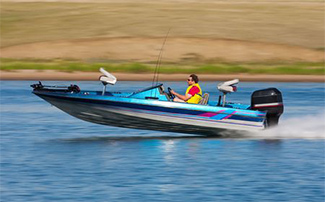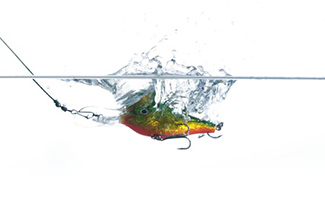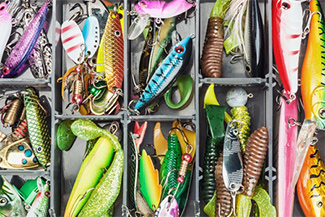 Fishermen are masters at three things, marketing, selling, and maintaining a positive outlook on life. After all, how else could they make the 400th cast of the day when they had zero bites on all their other casts?
Fishermen are masters at three things, marketing, selling, and maintaining a positive outlook on life. After all, how else could they make the 400th cast of the day when they had zero bites on all their other casts?
There are no pessimists fishing. Pessimists, give up when things are slow and see the glass as empty (no fish) when a pro fisherperson sees it darn near full: “Wow, what a great sunrise, it’s a super day and I’ve not thought about a single problem since I left home this morning. And all those fish are still out there waiting for me!”
Even if they don’t catch a fish, they’ll say, “It was a great day, I don’t have to clean any fish!” What’s the lesson here? [quotes]Keeping a positive mental attitude is critical to success in the face of adversity. [/quotes]
Here's a question: Besides boundless optimism, what else does an angler know that will help you sell and market more effectively?
[quotesright]You never see a pro angler trying to win a fishing tournament by casting in the paved parking lot at a mall. [/quotesright] They know that until they know exactly what they want to catch and where those fish school in quantity, they can’t possibly succeed. So, they gain a thorough understanding of the behavior of their quarry, where they are concentrated, and when is the best time to catch them.
[quotes]A fisherman understands the buyer’s journey[/quotes] from an initial triggering need to closing the sale to completing the deal (you have to get the fish in the boat!). Besides knowing they must be where the fish are and be there when the fish are hungry, they have to first get the attention of their quarry once they have an area pinpointed where the fish congregate. They engage it with a promise of a better future (full belly), attracting the fish by using light reflecting holograms, rattling beads a that mimic the sounds and even some magic juice that they have applied to their bait. The point is this mimics their quarry’s tastiest prey gives off and seems to fulfill the fishes desire for a better future.
If the fish doesn't spot your bait, it can't bite. Sound like good advertising to you? Right place, right time, right offer?
They know they must give the fish the information needed to make a “buying”decision. They do that by demonstrating their offering is the best possible choice with seductive moves and other tantalizing indications this will be an easy meal. Finally, they have to make the offer easy to act on, no application form needed, just bite the bait.
A fish, of course acts differently than a person and not so complex so there are fewer things to consider but in general, what it takes to sell the fish (client) is the same.
Just like a master marketer, [quotesright]fishermen develop client personas[/quotesright] (in-depth descriptions of customer segments and what motives them, psychographics, etc.) and when they are most active (marketers call this “timing”). For example, it’s not just a largemouth bass with scales, it’s a female on the bed (fishing term meaning spawning) aggressively protecting her eggs that can be found in fresh or brackish shallow water in the late fall or early spring. You can tell they are active because you can see the beds the fish create in the shallow water.
Fishermen know part of the the female bass' buyer’s journey is an innate reflex to remove a potential threat from the bed with their eggs. Taste, therefore is not a consideration. Now, that’s a precise, in-depth persona showing in depth customer understanding of timing, location and motivation!
Like any good marketer,they know that to get a bite, they must be at the right place at the right time.
For example, largemouth bass are not on beds in the depths of inter in the northern end of their range. They are in deep water pockets and generally slow moving since they are cold blooded. Compare that to the spring and summer when the water is warmer and they are bedding. Then their metabolism is faster and “fish love” is in the air, er, water.
 Successful fisherman know their baits (marketers call those an ad) must be different and retrieved differently because of where the fish is in its life cycle. The bass’ (prospect’s) different life stage or the year (bass don’t have careers as far as I can tell so we can leave that factor out here) dictate different presentation strategies and are looking for the newest lure on the market to attract attention (marketers would call that “pattern interrupt” [quotesright]– ‘Woah, I haven’t seen one of those before, can I eat it? It sure looks tasty.’). [/quotesright]
Successful fisherman know their baits (marketers call those an ad) must be different and retrieved differently because of where the fish is in its life cycle. The bass’ (prospect’s) different life stage or the year (bass don’t have careers as far as I can tell so we can leave that factor out here) dictate different presentation strategies and are looking for the newest lure on the market to attract attention (marketers would call that “pattern interrupt” [quotesright]– ‘Woah, I haven’t seen one of those before, can I eat it? It sure looks tasty.’). [/quotesright]
Fishermen who are successful know bait's presentation must be precisely targeted to their audience so it’s appealing (Marketing term: “offer”). But that's not so easy, even what worked this morning may not work now. [quotes]The people who win tournaments know that they can’t pick the best bait 100 percent of the time.[/quotes]
Sure, they may start with a proven bait (marketers call this a “control” piece or ad) that is based on their prior experience. They will also conduct research (also known as guzzling beer at the marina bar and pumping everyone for what the fish are hitting now or shopping for the secret "new" lure just out at the bait shop.) trying to figure out what will work best then try the new bait to see if it outperforms their go-to bait.
That is, [quotesright]fishermen do what all good marketers do, test. [/quotesright] They try the best offer they have in their arsenal based on all they know and see if it works and try variations to see if they can do better.
 They try variations in time, location, color, add-ons like spinners, speed of retrieve (marketers would call this variations in copy, engagement devices, free downloads, etc.) and see if something catches more fish. No? Gets half-hearted strikes but no hookups? Time to A/B test with a different bait against their first and bait (“control”) and see if the strikes (response) improve.
They try variations in time, location, color, add-ons like spinners, speed of retrieve (marketers would call this variations in copy, engagement devices, free downloads, etc.) and see if something catches more fish. No? Gets half-hearted strikes but no hookups? Time to A/B test with a different bait against their first and bait (“control”) and see if the strikes (response) improve.
Fishermen learn from testing. Better? OK, now see if adding some more inducements like “Uncle Joe’s deadly sure fire fish oil” improves response? No? We’ll try a rubber skirt to give the lure more action. Marketing term: "Copy, image, color, headline promise. The measure: Response rate".
Fishermen know how to target market, test, and avoid the time-wasting, undesirable customers as well as anyone in marketing today.
[quotes]Anglers want to reject as many undersized or undesired (Marketing term “unqualified” or “low value”) quarry as possible.[/quotes] For example, age is a big deal in bass. Most young bass is not going to try to eat a 12-inch bait (Yes, there are some bass 12 inches long who’ll make one heck of an attempt to eat something as big as they are as a result of bad judgement or aggressiveness.) That’s just like an unqualified prospect isn’t it?
It’s test, test, test, trying to find the highest responding bait (ad) that maximizes their ROI – or ROC (return on cast); one that maximizes lunkers and minimizes fish that are under-size and underweight. Fishermen really are master marketers, the test, they measure, the good ones keep detailed logs of everything used. They get smarter and smarter.
Lest you think fishermen are all a bit dim, let me inform you [quotesright]they understand ROI as well as any chairman of the board. [/quotesright] Some catches are more profitable than others. The pro anglers want to catch the trophy, the tastiest fish, not just any fish.
A tournament angler might go for the biggest possible fish while a regular fisherman wanting to eat their catch may well see mid-size fish as superior in texture and taste. Either helps meet their "marketing" goals by tossing back the ones they don’t want.
Fishermen are superb salespeople!
They know that when they see a bobber dip or feel a tug on the line they have a prospect who is showing definite signs of interest. They start to qualify their prospect immediately:
[quotesright]But the sale isn’t closed yet, you still have to hook that fish. [/quotesright] The fish is definitely interested and is starting to believe this might be the answer they were looking for. But, the fish could get suspicious because the bait just doesn’t feel or taste right and spit it out.
Fish, like human buyers that have been hooked on bad promises and half-truths, are really suspicious of you, your ad, your promises, and your offer. In other words, they are a tough quarry. They’ve been burned and have seen all the gimmicks. Fortunately, a fish brain isn’t as large as a human brain (although his may be debatable) and so they tend to occasionally forget.
[quotesright]The fish is carefully evaluating your bait[/quotesright] (your offer and solution) just like your customer. The fish is thinking, “Is this real? Is this a scam and I’ll get gaffed? Is it tasty? Is it right for me? Do I like the colors? Is this my best choice?”
Like a good salesperson, the fisherman gets that. They entice the fish with appropriate motion, convincing them it’s live, it’s real and looks even better than the fish first imagined. They pace the sale, speeding up or slowing down their retrieve based on the reaction of the fish. They may even stop, put the reel in free-spool or let the fish run with the bait.
A good fisherman knows the fish, like your customer, will only buy (okay, bite) after all their questions have been answered, their concerns allayed, and they are convinced that this is perfect for them.
Your offer may be perfect but the buyer still hesitates and balks. [quotes]Sometimes you just have to nurture the buyer a little to help them do what they want to do anyway.[/quotes] Psychologically, they are afraid of making another mistake having been burned before by other “perfect” bait or deals. That’s where moving slower or using a gentle nudge (i.e., an ethical close) can breakthrough and close a sale that’s at the tipping point. (Example: Let a good prospect take the car they love home for a couple of days before setting the hook (closing the deal - salespeople call this the “puppy dog close”).
Sometimes you get the fish to follow the bait right to the boat and then [quotesright] (“takeaway close”) [/quotesright] you start to lift the bait from the water and WHAM, you’ve caught the fish.
Yes, it's true that people are not fish, even those who think or shake hands like a dead one...
Let me be the first to point out that professional salespeople don’t try to manipulate prospects into getting hooked on empty promises and half-truths. Why? One, it’s unethical and possibly even illegal. Second, it's hard work and dumb since you get returns and a bad reputation for high pressure selling tactics.
No reputable company would condone selling prospects a product or service that they don’t want, can’t afford, and don’t need, even if they could do it. (“Too Big to Fail” west coast bank question: You tried that strategy, how’d it work out for you?).
Lest my sales friends be offended by the use of “reel” here, that is what you do in fishing. However, it doesn’t imply any sales professional “reels in” a hapless prospect. If it even succeeds in working, it is selling unethically and sure to come back in the form of complaints, returns, ill will, bad social media posts, or worse all to the detriment of the company.
Granted, fishing is fundamentally bad for the customer and no reputable business that expects repeat customers or word-of-mouth leads would ever offer a product or service that would hurt a customer – politicians excepted, but that’s another article.
[quotes]Done right, the fish hooks itself. Done wrong and you reel in an empty hook.[/quotes] Just like selling, it takes practice, knowing a professional process and adapting it for your buyers, helping them make the decision that they want you to help them make in the first place.
And one final sales-fishing analogy:
[quotesright]Don't accept a no as a no.[/quotesright]If you had a didn't get a bite from an otherwise promising spot where you know there is a good fish or even had a fish half-heartedly strike at your bait, it isn't a definitive no. It’s just “no” not right now, so you have to cast again and again in the same place. You may wait a while and circle back.
You might vary the placement, speed, or something else but fishermen and sales people have learned that it may be on the third, fourth, or fifth cast, even a third or fourth time they come by and try; when the fish feel the time is right and become comfortable enough with your offer to bite. It’s no different in sales: you call back, follow-up, and persist (with reason).
[sidebar]
Do What the Pro's Who Win Do
Getting coached by a professional coach and work with you will improve your fishing or business because they impart knowledge you didn't have and give you points of view you didn't have. They'll do so faster and quicker and with greater certainty than you might ever do on your own.
In the business world, we call those guides professional business coaches . In fishing, they are called, well, fishing guides. And yes, there are businesses teaching fishing. For example, Orvis operates a business guide service teaching people to be expert fly fishermen. FocalPoint Business Coaching and Training is your coach for business and sales success.
Let's have a conversation about how coaching can revolutionize your and your team's success. listowner:cb_phone_1} feedback@focalpointcoaching.com
[/sidebar]
Now here’s a big takeaway for you…
[quotes]Great marketers, great salespeople, even business leaders and great fishermen were not born that way.[/quotes] They got that way by studying, taking classes, finding mentors and workshops to increase their skills. They worked hard at their job, studying, being introspective, keeping an open mind, being methodical, keeping records, knowing their customers and products intimately, and how and when to present them.
[quotesright]If you want to be the best, you have to be willing to learn, adapt, and continually improve, [/quotesright] taking classes, attending workshops and training classes, finding mentors and hiring experts to work one-on-one with you to teach you things you don’t know and provide new perspectives you don’t possess.
[quotes]If you’re not filling your limit or getting what you want out of your business: Hire a guide. [/quotes] You’ll be glad you did an be the person getting plied with free beer down at the “marina” or mid-town bar to find out how come you catch all the fish and are so successful.
** For all you ladies out there, we are not insensitive fishermen, it’s one of the vagaries of the English language that we are shoehorned into using for gender neutral. We thought about “fisherpersons” but it just doesn’t conjure up the image of a good ol‘ boy with a beer in his hand fishing…our apologies.